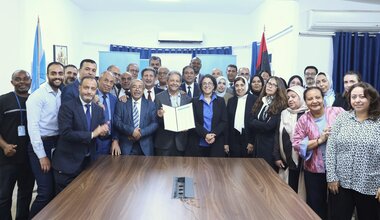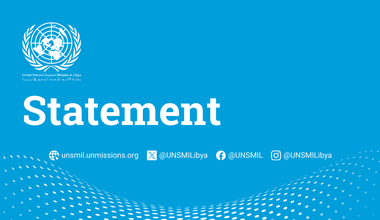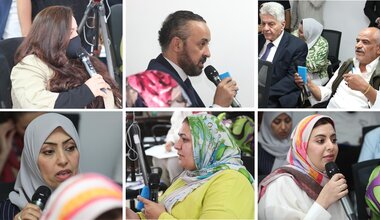Libyan Experts Forum Devises Ways to Contribute to Country’s Post-conflict Recovery
Tunis, 12 October 2015 – A meeting of Libyan academics, prominent experts and business leaders convened in Tunis 11-12 October 2015 with a view to addressing the country’s socio-economic problems and exploring ways to contribute to post-conflict recovery under a future unity government.
The Libya Experts Development Cooperation Forum provided a platform for the group of Libyan participants to engage in insightful discussions on the current humanitarian situation in their country as well as development issues.
Deputy Special Representative of the Secretary-General for Libya, Ali Al-Za’tari, emphasized the crucial advice emanating from this forum to a future Government of National Accord whose prime task is to restore stability to the country and put it on the road to economic recovery.
“We have high hopes in you. It is a heavy burden to carry, but we count on you,” he said in opening remarks. “Moving from peace-making to state-building is a joint responsibility.’’
Participants reviewed and recommended priorities and modalities to approach economic recovery and socio-economic development in Libya for short and medium term as well as for a longer term National Development Agenda, and agreed to further work together, in partnership with the international community, to define needs and identify policy options.
Participants welcomed the debate during the past two days, and they hoped it will help the new government in drawing policies and setting priorities on various pressing issues as well as looking into long-term development.
"The discussions at this timely Forum provided a comprehensive assessment of the economic and social challenges facing Libya and outlined the pressing policy priorities for the Government of National Accord," said Tarik M. Yousef, one of the Libyan experts.
Mohammed Abusneina, a professor of economics, stressed fiscal policy as a priority. “Among the very important issues that should be addressed by the unity government are the fiscal reforms and the application of fiscal rules, promoting economic growth and the full ownership of oil production and revenues by the central government. Also, the public spending should be countercyclical for the restoration and improvement of basic services”, he said.
Awad Ibrahim, an infrastructure and electricity sector expert, said the new government should work promptly to alleviate the suffering of the population.
“The Government of National Accord must consider the services delivery as an immediate priority - particularly electricity and water supplies - in order to improve the living conditions of the Libyan population, based on forward looking plans, and also to look into the legacy and reconstruction projects,” he said.
Azza O. Boghandora, a university professor, said investment in the future should also be in human resources. “The Libyan youth and women deserve better education and employment opportunities, in support of a longer term socio-economic transformation of the country,” she said.
Participants also stressed that Libyan national ownership is of paramount importance. They emphasized that ending the divisions in State institutions is key to Libya’s survival and sustainable future and expressed their firm conviction that only through a credible unity government can the country’s problems be tackled. They have reconfirmed the leading role of the United Nations in supporting Libya to coordinate the international assistance and encouraged efforts to enhance the national capacity to absorb the international assistance offered.
The meeting was organized by the United Nations Support Mission in Libya (UNSMIL), the United Nations Development Programme (UNDP), the Economic and Social Commission for Western Asia (ESCWA), the World Bank (WB) and the International Monetary Fund (IMF) and was also attended by representatives of UN member states, regional organizations and UN Agencies, Funds and Program working on plans to support the unity government.
The work of the Libyan experts under the umbrella of this Forum will guide the international community in refining a common vision and approach to support unified State institutions, and to prepare the ground for long-term revival and development of Libya’s international cooperation.
“It is necessary to affirm that the international community is ready to support Libya through bilateral or multilateral cooperation,” Mr. Al-Za’tari said. “It is up to Libya and the international community to determine the shape and form of this cooperation to ensure coordination and avoid harmful competition,” the Deputy Special Representative for Libya added.
Participants agreed to reconvene in December 2015 for a follow-up meeting.
 United Nations Peacekeeping
United Nations Peacekeeping UN
UN














